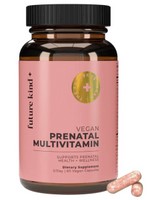Prenatal Supplements for Vegans
Prenatal multi-vitamin/multi-mineral supplements are often recommended in pregnancy to help make sure that the higher nutritional needs of pregnancy are being met. In the United States, more than 70% of pregnant and lactating individuals use at least one dietary supplement, most often a supplement labeled as being a prenatal supplement (1). There are a number of vegan prenatal vitamin/mineral supplements. If you’re deciding between products or thinking about whether to use a supplement, here are some things to think about.
One consideration is the adequacy of your diet. If you generally eat a healthy vegan diet with a variety of dried beans, whole grains, nuts and seeds, vegetables, and fruits you’re likely to be getting enough of many vitamins and minerals. If you’re concerned about the adequacy of your diet, it can be helpful to meet with a registered dietitian who specialized in prenatal nutrition and who is familiar with vegan diets.
There are a couple of nutrients where supplements are recommended for all pregnant individuals because of the important roles of these nutrients in pregnancy. Expert groups, including the U.S. Preventive Services Task Force and the American Thyroid Association, respectively, recommend that a 400-800 microgram folic acid supplement and a 150 microgram iodine supplement be used in pregnancy (2,3). A prenatal supplement that supplies these and other nutrients reduces the number of pills that you have to swallow. Don’t assume that all prenatal supplements supply folic acid and iodine; it’s important to check the label. A survey of the top-selling prenatal vitamin/mineral supplements sold in the United States found that only 58% contained iodine (4).
Vegans also need a reliable, daily source of vitamin B12 during pregnancy; this reliable source can be fortified foods, a stand-alone vitamin B12 supplement, or a prenatal vitamin/mineral supplement that provides vitamin B12. Vegan Health, a website that provides evidence-based nutrition recommendations, suggests use of a once-daily supplement in pregnancy that supplies 10-250 micrograms of vitamin B12 (5).
Other nutrients that can be challenging for vegans in pregnancy include iron, zinc, calcium, vitamin D, and choline.
Here’s the amount of each needed in pregnancy:
| RDA for adult pregnancy | Sources include | |
| Iron | 27 milligrams (vegans may need 80% more – 48.6 milligrams) | Dried beans, whole grains, fortified foods |
| Zinc | 11 milligrams | Dried beans, wheat germ, tofu |
| Calcium | 1000 milligrams | Leafy green vegetables, fortified plant milk |
| Vitamin D | 15 micrograms (600 IU) | Sunlight exposure, fortified plant milk |
| Choline | 450 milligrams (Adequate Intake) | Soy foods, dried beans, quinoa, peanuts and peanut butter |
Thinking about your diet can help you to determine if it’s important that your prenatal supplement supplies one or more of these nutrients. Iron is especially challenging because so much is needed to support pregnancy. You don’t need to get 100% of the RDA for these nutrients from a supplement; your diet should provide at least part of your needs. Depending on your diet, there may be other nutrients that you need to supplement. For example, if you don’t eat many fruits or vegetables, I’d be concerned about vitamin C and vitamin A.
If you think your diet is low in one or more of these nutrients, look for a vegan prenatal supplement that supplies the nutrients of concern. Many prenatal multi-vitamin/multi-minerals supplements don’t supply much calcium so, if you aren’t using a calcium-fortified plant milk or eating plenty of green leafy vegetables, a separate calcium supplement may be needed.
DHA supplements or food sources of DHA appear to reduce the risk of having a premature or low birth weight infant (6). Sources of DHA for vegans are limited and a vegan supplement supplying at least 200 milligrams per day of DHA may be beneficial. DHA is rarely included in vegan prenatal supplements so a separate supplement may be needed.
References
- Jun S, Gahche JJ, Potischman N, et al. Dietary supplement use and its micronutrient contribution during pregnancy and lactation in the United States. Obstet Gynecol. 2020;135(3):623–633.
- US Preventive Services Task Force, Bibbins-Domingo K, Grossman DC, et al. Folic acid supplementation for the prevention of neural tube defects: US Preventive Services Task Force Recommendation Statement. JAMA. 2017;317(2):183–189.
- Alexander EK, Pearce EN, Brent GA, et al. 2017 Guidelines of the American Thyroid Association for the diagnosis and management of thyroid disease during pregnancy and the postpartum. Thyroid. 2017;27(3):315–389.
- Patel A, Lee SY, Stagnaro-Green A, et al. Iodine content of the best-selling United States adult and prenatal multivitamin preparations. Thyroid. 2019;29(1):124–127.
- Vegan Health. Daily needs. Vitamin B12. https://veganhealth.org/daily-needs/#Vitamin-B12.
- Middleton P, Gomersall JC, Gould JF, et al. Omega-3 fatty acid addition during pregnancy. Cochrane Database Syst Rev. 2018;11(11):CD003402.
To read more about vegan pregnancy see:
Vegan nutrition in pregnancy and childhood
To read more about dietary supplements see:
Do vegetarians have to take vitamin B12 supplements?
NIH’s Office of Dietary Supplements Offers a Helpful Dietary Supplement Label Database
The contents of this posting, our website, and our other publications, including Vegetarian Journal and Vegan Journal, are not intended to provide personal medical advice. Medical advice should be obtained from a qualified health professional. We often depend on product and ingredient information from company statements. It is impossible to be 100% sure about a statement, info can change, people have different views, and mistakes can be made. Please use your best judgment about whether a product is suitable for you. To be sure, do further research or confirmation on your own.

